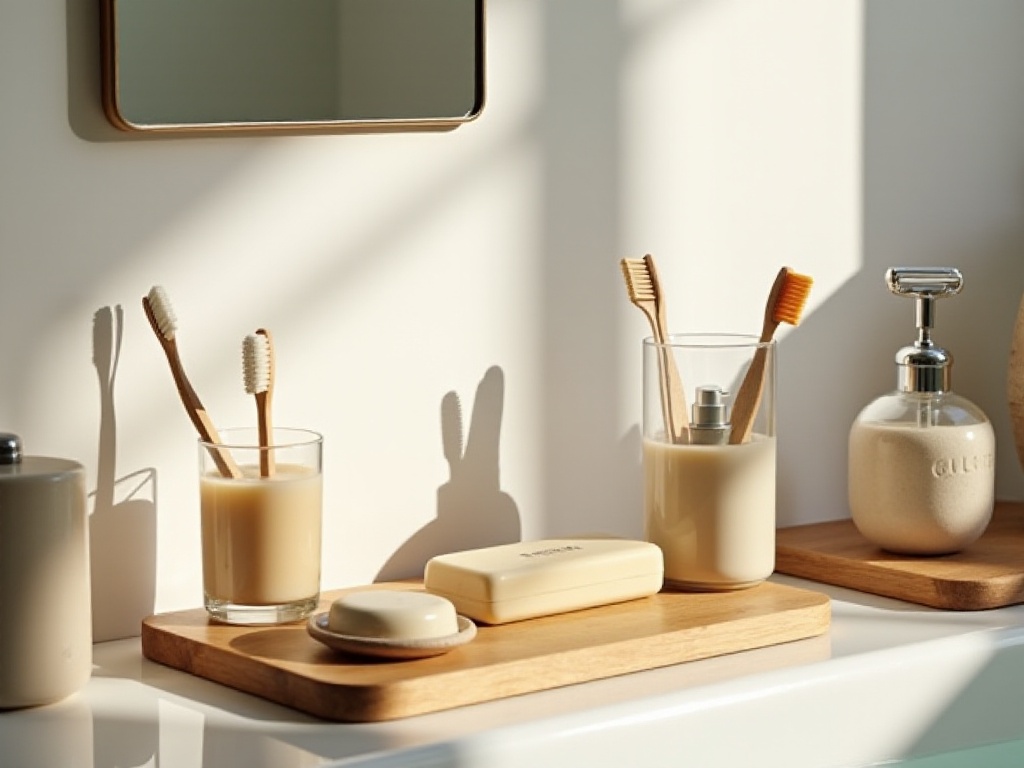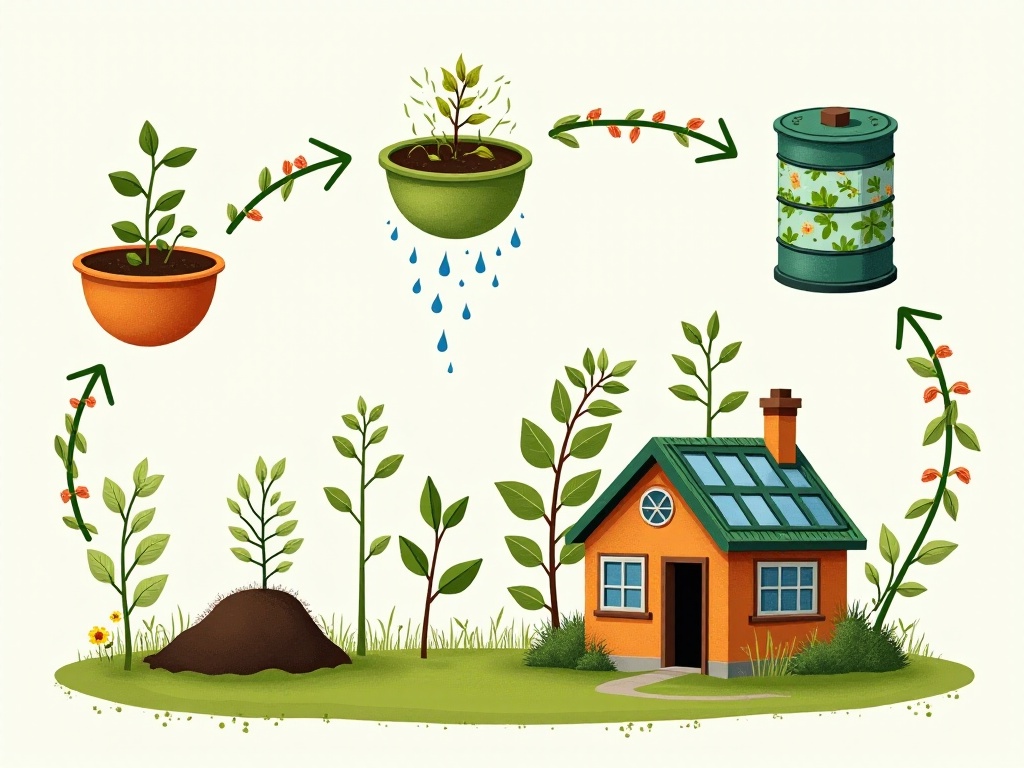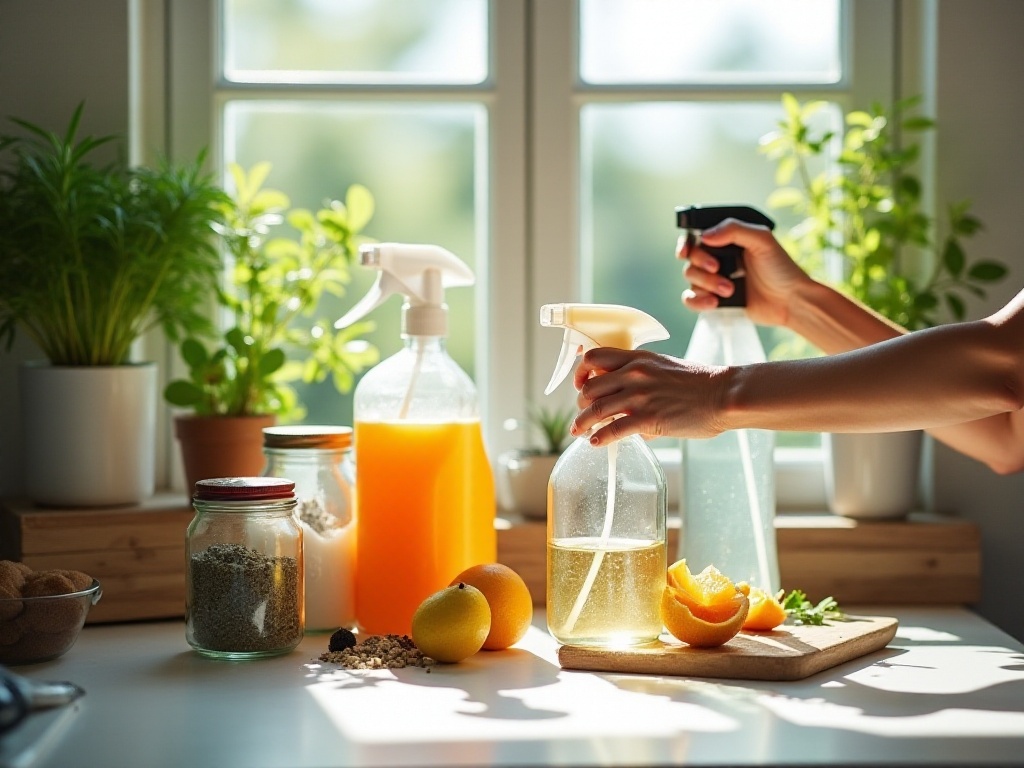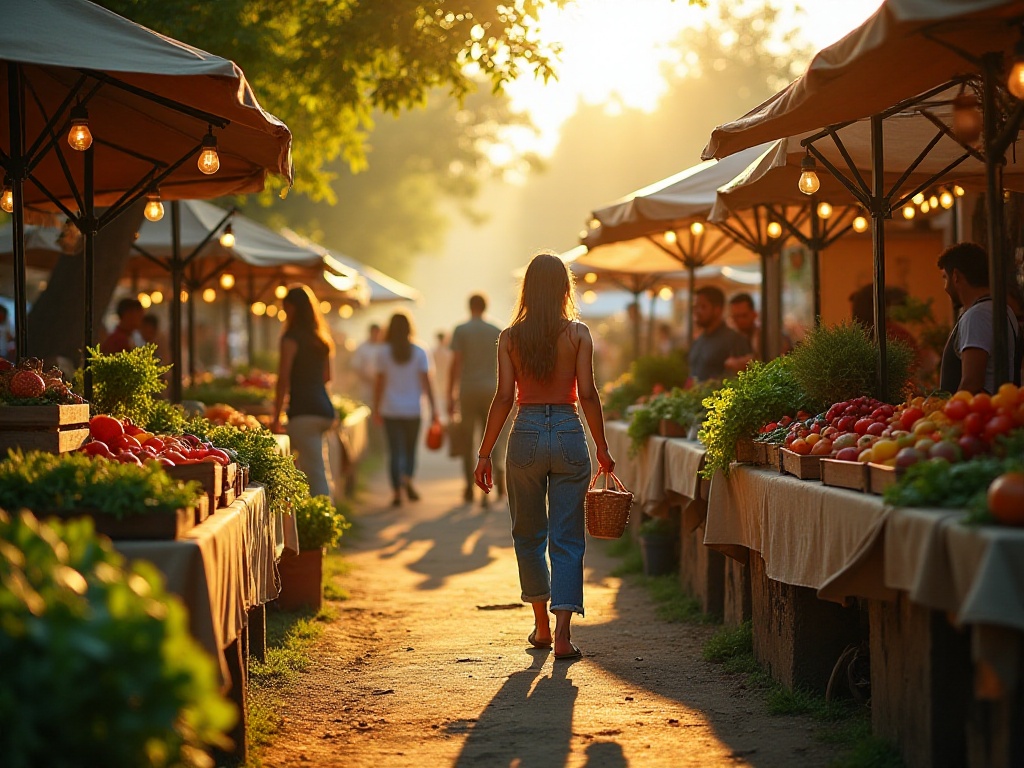Introduction
Recently, I've noticed more and more friends around me starting to care about environmental protection and sustainable living. To be honest, when I first heard the term "zero waste living," it sounded very sophisticated and distant from our daily lives. But as I gradually put it into practice, I discovered that these are actually very down-to-earth habits that anyone can adopt if they're willing.
Today I'd like to share some tips and techniques from my zero waste living practice. Don't feel overwhelmed - these changes can be made gradually. It's like running - you might only be able to run a few hundred meters at first, but with persistence, you'll be able to run further and further.

Reduce
Think Before Buying
When it comes to shopping, I have many painful lessons to share. Once during Singles' Day, I saw an super cute hoodie on sale and bought it without thinking. Guess what happened? I only wore it twice before it ended up collecting dust in my closet because it didn't suit my style at all. This made me realize that I really need to think carefully about whether something is necessary before buying it.
Now everything on my shopping list has to pass the "think thrice" test: Do I really need this? Can something I already own serve the same purpose? Will I use it regularly? This not only saves money but also helps avoid unnecessary waste.
Choose High-Quality Durable Items
I have a friend who loves buying cheap bags, getting one or two every month. But these bags start peeling and breaking straps after short use. Later, I suggested she buy one good quality bag instead. Though it required a bigger initial investment, it could last for many years. She took my advice and bought a nice leather bag, which still looks new after more than two years.
This taught me that instead of buying many cheap items of mediocre quality, it's better to invest in high-quality products. For example, with kitchen utensils, a good stainless steel pot might cost several hundred yuan, but it can last for ten years or more; in comparison, those cheap pots that cost tens of yuan might need replacement after a short time.
Bulk Buying
Advantages of Bulk Items
Recently I discovered a zero waste store near our community that sells bulk daily necessities and food items. On my first visit, I brought some glass jars and bought rice, nuts, and seasonings. I must say, this shopping method is really great! Not only are the prices cheaper than packaged goods in supermarkets, but you can also buy exactly the amount you need without worrying about buying too much and letting it spoil.
I especially love buying nuts in bulk because I can mix different types and buy just the amount I want. Bulk nuts are often fresher than packaged ones that might have been sitting on shelves for a long time. After shopping, I sort these ingredients into glass jars, and seeing the neat rows of jars in my kitchen makes me feel good.
Container Storage
Speaking of storage containers, my home is now completely taken over by various glass jars and stainless steel boxes. I've found these containers are not only practical but also look good. I label each container with its contents and the purchase or preparation date. This makes management easier and helps prevent ingredients from expiring.
Sometimes when friends visit, they comment on how stylish my storage system is, but this is actually the simplest form of zero waste living! Plus, these containers can be reused for many years, which is much more environmentally friendly than using plastic bags every time.
Avoid Single-Use Plastics
Using Alternatives
Honestly, it's really hard to completely avoid using plastic, but we can start with small changes. For example, my essential trio when going out now includes: a canvas bag, stainless steel water bottle, and reusable straw. You might forget to bring them at first, but it becomes a habit after persisting for a while.
I love my metal straw the most - it looks great and feels much better to use than plastic straws. Though it seemed expensive when I bought it, when I think about how a single plastic straw takes hundreds of years to decompose and its impact on the environment, this investment is really worth it.
Canvas Bags and Stainless Steel Water Bottles
My canvas bag has been used for over two years now, and though it's a bit old, it gets better with use. Every time I go grocery shopping and see others carrying multiple plastic bags, I feel good about my choice. Plus, many supermarkets now charge for plastic bags, so using canvas bags is not only environmentally friendly but also saves money.
As for the stainless steel water bottle, it's been a lifesaver. I used to buy bottled water frequently, but now bringing my own water not only saves money but also lets me drink water at the right temperature anytime. In summer, I can add lemon slices - it's both refreshing and looks nice.
Reduce Food Waste
Shopping Plan
I used to buy ingredients without planning, which often resulted in having too much food that went bad. Now I've learned to plan my shopping in advance, thinking about what dishes I'll cook next week and what ingredients I need. This not only prevents waste but also makes my meals more organized.
My current method is: first check what ingredients are still in the fridge, then plan meals based on these ingredients, and finally make a list of what needs to be replenished. This ensures efficient use of ingredients and prevents duplicate purchases.
Leftover Management
When it comes to managing leftovers, I'm quite skilled! I used to think leftovers were just leftovers, but now I see them as ingredients for creative new dishes. For example, leftover rice can become delicious fried rice the next morning; leftover stir-fries can become sandwich fillings; even leftover bread can be made into bread pudding.
My proudest "waste-to-treasure" transformation is turning nearly spoiled fruits into jam or smoothies. Bananas turned black? No problem - they can become banana bread or frozen for ice cream. This not only prevents waste but also allows us to enjoy different foods.
Choose Products with Less Packaging
Bulk Food
Now I mostly buy groceries from farmers' markets or bulk sections in fresh food supermarkets. Not only can I select fresh ingredients myself, but I can also avoid unnecessary packaging. I've found that bulk fruits and vegetables are often much cheaper than pre-packaged ones.
I especially love buying seasonal fruits and vegetables - they're not only fresh and affordable but also have a shorter transportation distance, which means less environmental impact. I've become very sensitive to seasonality now and know what fruits to buy when - I feel like I'm becoming an expert!
Recyclable Packaging
For packaged foods that I must buy, I prioritize products with recyclable packaging. For example, I choose milk in paper cartons rather than plastic bottles because paper cartons are easier to recycle.
Sometimes when I see products with multiple layers of packaging, I wonder if all that packaging is really necessary. Now I specifically look for products with simple packaging, supporting eco-friendly packaging through my actions.
Reuse
Reusing Containers
Glass Jar Storage
My home is now filled with glass jars, from jam jars to pickle jars - I collect any glass container. After cleaning, these jars can have countless uses. I love using them to store various seasonings and dry goods, and seeing the neat rows of glass jars in the kitchen gives me great satisfaction.
I use some larger glass jars for making fermented foods like pickles and yogurt. Some smaller jars have been transformed into succulent planters, looking adorable on the windowsill. Each glass jar has its own story, and that feeling is really wonderful.
Reusing Old Containers
Besides glass jars, other containers can be reused too. For example, empty shampoo bottles can store homemade cleaners, and large plastic bottles can be transformed into planters or storage boxes. I've even turned old drink bottles into automatic watering devices for plants.
These creative ideas not only give items new life but also save money on buying new containers. Plus, every time I see these repurposed containers, I feel a sense of achievement, feeling like I've made a small contribution to environmental protection.
Repair Instead of Replace
Mending Clothes
Honestly, I knew nothing about sewing before, but for the sake of environmental protection, I decided to learn basic mending skills. Now I can handle simple issues like replacing buttons, fixing loose seams, or patching small holes.
My most satisfying achievement was repairing a hole in an old sweater - I made a small pattern with different colored threads, which turned it into a unique, personalized piece. Since then, I've started to find mending clothes quite interesting.
Repairing Furniture
When furniture breaks, it doesn't always need to be replaced. We had a wooden chair that was becoming loose - initially, I thought about throwing it away and buying a new one. Later, I learned some simple woodworking techniques online and fixed it myself. Though the process was a bit challenging, it saved the cost of buying a new chair, and the sense of accomplishment from DIY work was really great.
Now my philosophy is: if something can be repaired, try fixing it first, and only consider replacement if it's truly beyond repair. This not only saves money but also reduces waste generation.
Repurposing Old Items
Transforming Old Clothes
Old clothes can be reborn in many ways. I recently got into transforming old T-shirts into shopping bags - it just takes simple cutting and sewing. Some worn-out jeans have been turned into shorts or used for fabric crafts.
One of my favorite projects was making a pillowcase from an old shirt, keeping the shirt's pockets and buttons - it looks very designer. These transformations not only give old clothes new life but also add unique decorative items to our home.
Repurposing Old Cans
Repurposing old cans is another interesting project. I've turned some large tin cans into pencil holders and vases by spraying them with pretty colors - they don't look like waste at all. Small cans, once cleaned, can be used to store stationery or jewelry.
Recently, I tried making a simple wind chime from old cans, hanging it on the balcony. When the wind blows, it makes crisp sounds, making the whole space come alive.
Reusable Shopping Tools
Shopping Bags
Now when I go shopping, I always carry various sized shopping bags. I have large canvas bags for heavy items and small fabric bags for miscellaneous items. These bags are very sturdy and can be used many times.
I especially love a foldable shopping bag that becomes very compact - it takes up almost no space in my purse but can be pulled out whenever needed. This way, I never need to use plastic bags for impromptu shopping.
Shopping Baskets
Speaking of shopping tools, I must mention my beloved shopping basket. While using a shopping basket might seem a bit retro nowadays, I think it's the most practical shopping tool. It can hold many items and doesn't hurt your hands when carrying.
My basket is woven from rattan - it's both eco-friendly and artistic, looking good even as home decoration. After using it for so long, it's developed more character, like a faithful shopping companion.
Reusable Water Bottles and Utensils
Carrying with You
When going out, I always bring my own water bottle and utensils. There are many stylish thermal cups and utensil sets available now that are both practical and attractive. I particularly love my wooden utensil set, which includes chopsticks, a spoon, and a fork, all kept in a small fabric pouch that's convenient to carry.
These reusable utensils are not only environmentally friendly but also feel much better to use than disposable ones. Especially in summer, drinking from your own cup is much more hygienic than using paper or plastic cups.
Reducing Single-Use Items
Since developing the habit of carrying my own water bottle and utensils, I've found that my use of disposable items has greatly decreased. Even at coffee shops, I actively ask them to pour coffee into my own cup. Many stores now support bringing your own cups, and some even offer discounts.
These small changes add up over time, not only contributing to environmental protection but also saving money. Plus, using your own utensils makes eating feel more ceremonial.
Recycle
Proper Waste Sorting
Local Regulations
To be honest, when I first started sorting waste, I found it very troublesome. Remembering what's recyclable, what's food waste, and what's other waste really requires an adjustment period. But now I'm completely used to it, and sorting has become instinctive.
Our community has strict waste sorting management, with specific times and locations for disposing of each type of waste. Though it seemed troublesome at first, seeing the community environment improve and the visible effects of waste sorting makes all these efforts worthwhile.
Sorting Methods
To facilitate waste sorting, I've set up different bins at home for collecting recyclables, food waste, and other waste. Each bin is labeled so everyone in the family can easily sort their waste.
Especially in the kitchen, I've set up a small food waste bin specifically for collecting fruit peels and vegetable scraps. This waste can be used for composting, becoming nutrients for plants.
Recyclable Materials
Paper, Plastic, Glass
For these recyclable materials, I carefully clean and sort them before recycling. For example, plastic bottles need their caps and labels removed, cardboard boxes need to be folded neatly, and glass bottles need to be cleaned. This not only makes it easier for recycling station workers but also increases the recycling value of these materials.
Sometimes when I see recyclable items carelessly discarded on the street, I can't help but pick them up and put them in the correct recycling bin. Though it's a small action, I believe if everyone does this, our environment will become better.
Metal Recycling
Metal is one of the easiest materials to recycle. I collect used batteries, cans, and other metal items at home and regularly take them to the recycling station. Electronic products, in particular, must be taken to specialized recycling points as they may contain harmful substances.
Once when cleaning my home, I found many old wires and metal parts. After taking these items to the recycling station, I not only contributed to environmental protection but also got some pocket money in return, which felt really good.
Buying Recyclable Products
Selection Strategy
Now when shopping, I pay special attention to whether product packaging is recyclable. For example, I choose condiments in glass bottles rather than plastic bottles because glass is easier to recycle. For necessities, I prioritize products with recyclable packaging.
Sometimes these products might be a bit more expensive, but considering their lesser environmental impact, I think the price is worth it. Plus, many products with recyclable packaging are of good quality and feel more reliable to use.
Environmental Impact
Every time I see news reports about a landfill being full, or images of plastic waste floating in the ocean, I become more determined to choose recyclable products. Though one person's effort might seem small, if everyone makes changes, the impact on the environment will be significant.
I often share these environmental tips with friends, and I'm glad to see more people starting to care about this issue. Sometimes seeing others share their eco-friendly lifestyle on social media is very encouraging.
Composting (Rot)

Composting Materials
Food Scraps
When I first tried composting, I was a complete novice. But through continuous learning and practice, I've now mastered quite a few techniques. I collect fruit peels, vegetable trimmings, and coffee grounds from the kitchen for composting.
Interestingly, through composting, I've discovered another value in many food ingredients. For example, banana peels are rich in potassium and make great composting material; onion and garlic skins can also provide rich nutrients for compost.
Coffee Grounds and Eggshells
As a coffee lover, I generate quite a lot of coffee grounds every day. I used to throw them away, but now I collect them for composting. Coffee grounds not only provide nitrogen but also improve soil structure.
Eggshells are another great composting material. I clean the eggshells, dry them, crush them, and sprinkle them around plants. This not only supplements calcium in the soil but also helps repel some pests.
Refuse
Refusing Unnecessary Items
Free Gifts
To be honest, I used to want anything that was free, but now I've learned to say "no." Those small gifts from promotional activities and flyers from shopping malls often end up as waste since they're things we don't need.
My principle now is: if I wouldn't buy it normally, I won't take it even if it's free. This not only prevents accumulating useless items but also keeps the home tidy.
Unnecessary Purchases
Impulse buying is really a hard habit to break. I used to be attracted by "limited time offers" and "last day" promotional messages, buying many things I didn't actually need. Now I have a rule: when I want to buy something, I wait 24 hours before deciding whether to purchase it.
This method is particularly effective because often after this cooling-off period, I realize I don't really need the item. This not only saves money but also prevents unnecessary waste.
Refusing Single-Use Plastics
Product Selection
There are many reusable alternatives available now, making it possible to break free from dependence on single-use plastic products. For example, I choose cloth sanitary pads instead of disposable ones, and reusable food wrap instead of single-use plastic wrap.
Though the initial investment might be larger, it's both environmentally friendly and economical in the long run. Plus, these reusable products usually have better quality and provide a better user experience.
Biodegradable Packaging
Many brands are now starting to use biodegradable packaging, which is a great trend. Although these packages might be more expensive than regular plastic packaging, considering that they can degrade in the natural environment without causing long-term pollution, I think the price is worth it.
I particularly support brands that use biodegradable packaging because it shows they're making efforts for environmental protection. I hope more brands will join this movement in the future.
Borrow, Swap or Share
Item Sharing
Sharing with Neighbors
Our community has a great tradition of sharing items that aren't frequently used. For example, I have a good bread maker that I don't use every day. When neighbors want to make bread, they can borrow it, and in return, they share freshly baked bread with me.
This kind of sharing not only allows items to be used more efficiently but also improves neighborly relations. Now our community has developed a great sharing atmosphere, with everyone helping each other, which feels really warm.
Tool Exchange
Speaking of tool exchange, I had a particularly interesting experience. Once I needed an electric drill to install a shelf, but buying a drill just for one use seemed wasteful. Later, I posted a message in the community group asking if anyone had a drill I could borrow, and surprisingly, a neighbor responded quickly.
Through this experience, I discovered that many tools can actually be shared. Now our community has established a tool-sharing WeChat group where everyone can ask for what they need - it's very convenient.
Item Exchange Activities
Exchange Strategies
I've participated in several community-organized item exchange events, which were really interesting. People bring unused but good quality items to exchange, allowing items to find new owners while getting things they need.
My strategy is to bring items that I truly don't need but are still in good condition for exchange. For example, clothes with wrong sizes, finished books, unused stationery, etc. This not only allows these items to continue being valuable but also helps me meet like-minded friends.
Activity Participation
These item exchange activities are becoming more common now, both offline and online. I often participate in book exchange activities, swapping books I've finished with other book lovers. This way I can not only meet new friends but also read more good books.
Sometimes you can find unexpected surprises at these events. For example, I once exchanged for a handmade craft I really liked at an exchange event, and even met the friend who made it - later we learned craft-making together.
Other Practical Tips
Making Your Own Cleaning Products
Using Natural Materials
Since I started making my own cleaning products, I've found that I use fewer and fewer chemical cleaners at home. The most commonly used combination is white vinegar and baking soda, which can clean almost everything in the house.
White vinegar mixed with water is great for cleaning glass; baking soda can remove various stubborn stains; essential oils not only add fragrance but also have disinfecting properties. These natural cleaning products are not only environmentally friendly but also better for health.
Reducing Chemicals
Previously, my home was full of various cleaners, but now they've mostly been replaced with homemade natural cleaning products. Although the cleaning effect might not be as immediate as chemical cleaners, knowing that they won't pollute the environment makes me feel at ease.
Plus, making your own cleaning products saves a lot of money. For example, a large bottle of white vinegar only costs a few yuan but can last for a long time. In comparison, those professional cleaners often cost dozens of yuan.

Buying Local Products
Supporting Local
I now really enjoy shopping at farmers' markets because many vegetables and fruits there are locally grown. They're not only fresh but also cheaper than supermarkets. Plus, being able to communicate directly with farmers and learn about how the ingredients are grown is really interesting.
Supporting local products not only reduces environmental pollution from transportation but also helps the local economy develop. Now our community has also organized a local produce group-buying chat group, where we can buy fresh seasonal produce every week.
Reducing Transportation Pollution
Think about it - an apple transported from thousands of miles away consumes so much energy and creates so much pollution. If we can buy locally grown fruit, it's not only fresher but also reduces carbon emissions from transportation.
Also, local seasonal products often better suit our body's needs. For example, eating locally grown watermelon in summer and radishes in winter is both healthy and environmentally friendly.
Raising Environmental Awareness
Personal Education
Environmental protection is actually a continuous learning process. I often search for environmental knowledge online and see how others practice zero waste living. Sometimes when I see creative ideas, I try them right away.
Recently, I also joined an environmental protection organization, and through volunteer activities, I've not only learned a lot about environmental protection but also met many like-minded friends. This process of learning and exchange has deepened my understanding of environmental protection.
Social Impact
Sometimes I share my environmental protection experiences on social media, and unexpectedly influenced quite a few friends. Seeing them start to try zero waste living makes me feel









